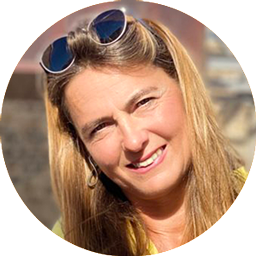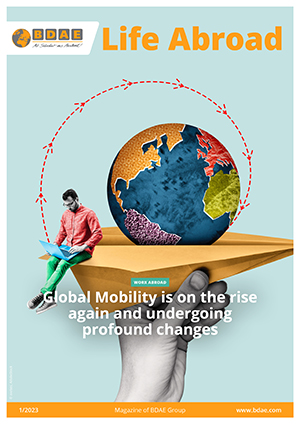"When you go to another country, you have to be ready to leave your comfort zone."
Ricarda Schönborn has been living abroad for many years and has now settled in Cyprus. In this interview, she talks about the diverse mentalities she encountered while residing outside of Germany, the reasons why a lot of emigrants are hesitant to address their health insurance, and the crucial role that maintaining good health plays in her life.
You have been living and working in Cyprus since 2018. Before that, you spent three years in Bali. Why did you choose to make Cyprus your home instead of Bali?
Ricarda: While Bali stole my heart, it ultimately wasn't a practical choice for me due to the significant time difference between Europe and Bali. As the majority of my clients come from Germany, Austria, and Switzerland, I would have had to work late at night, which clashed with my early morning yoga and meditation routine.
Therefore, I explored other potential countries to relocate to and eventually settled on Cyprus, where an old friend of mine has been residing for 15 years. I spent my first few months there, taking in the sights and sounds of Limassol at a leisurely pace.
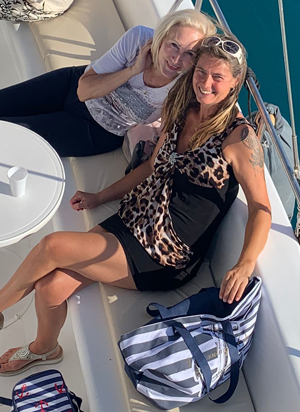 Boat tour, Limassol, Cyprus; © Ricarda Schönborn
Boat tour, Limassol, Cyprus; © Ricarda Schönborn
I was no longer interested in brokering health insurance and instead wanted to establish a brand new online business in Cyprus and sell my existing client base. Although I had only managed my German clients before, occasionally offering international health insurance policies to those who showed interest, my plans took a different turn.
Five years ago, there weren't many German-speaking emigrants in the Paphos region, where I settled. While some young start-ups were focused in Larnaca, I was drawn to Paphos due to its stunning natural surroundings.
Why has Cyprus become so popular with people who want to start their businesses in particular?
Ricarda: Cyprus provides favorable tax conditions, especially for limited companies, making it an attractive option. Additionally, non-European citizens are eligible to obtain an EU passport when purchasing property in the country. Although this privilege has been recently abolished for Chinese citizens, it has still drawn many others to invest.
One of my clients, the founder of the barefoot shoe brand feelgrounds, also relocated to Cyprus with his girlfriend around the same time as me. In 2018, he initiated the first German-speaking entrepreneurs' regulars' table in Larnaca, which began with a small group of five to eight people. Since then, there has been a significant increase in new emigrants, with roughly 30-40 arriving each month, leading to the establishment of German-speaking entrepreneurs' regulars' tables in other areas, including Paphos and Polis.
During those table meetings, newcomers often sought advice from me regarding international health insurance. As someone who wants to protect people from risks, I couldn't say no and would arrange insurance for them. Eventually, the founder of feelgrounds recommended me to the senior director of Cyprus' largest tax and law firm, PMG, for advice. Impressed with my advice and independence, PMG offered me a cooperation in mid-2018.
Although I initially wanted to pursue something different, I eventually accepted the offer at the end of 2018. I accepted it because PMG supports around 140 startups from the DACH region each month, many of whom need international health insurance. I had also realised that I would continue my work and use the in-depth knowledge I got from 18 years of practice for the benefit of our clients. It is especially important to offer an expert point of view because there is a lot of half-knowledge and half-truths on the internet from self-proclaimed experts.
Long before the whole boom, I was active in emigration groups, answering questions and passing on information. Many of my tips have been adopted by others. So, a layperson often can't tell if it's an expert or if someone is just doing good affiliate marketing. My company consists of a small but fine team of experts. Our clients especially appreciate the permanent support after the conclusion of the contract.
"I know from my own experience how important it is to be able to access good health care."
What, for example?
Ricarda: Insurance policies can be quite complex, and many people are unaware of the nuances and fine print involved. For instance, some policies may only provide coverage up to a certain limit, and certain Anglo-Saxon insurers may have cancellation clauses if the policyholder becomes seriously ill. Such details can be difficult for lay people to comprehend, and terms like "remedies" and "aids" may be unfamiliar to them.
I believe that this is also what makes up my advisory work. I really explain in detail what is and what is not included in an international health insurance policy. It is really important to me - and this really comes from the heart - that the people who come to me for advice get the right health insurance cover. I know from my own experience how important it is to be able to make use of good health care and to have the appropriate social security behind it.
After deciding to continue with the insurance business in Cyprus, my clients were satisfied with my service and began recommending me on various emigrant forums and groups. As a result, I started to receive bookings for one to two months in advance. In 2019, Sergio, one of the founders of Global Citizen Explorer and GoodbyeMatrix, approached me to do a first live webinar. Our cooperation has since developed, and we now offer exclusive deals to Goodbye-Matrix customers with many international health insurers that cannot be found elsewhere on the market.
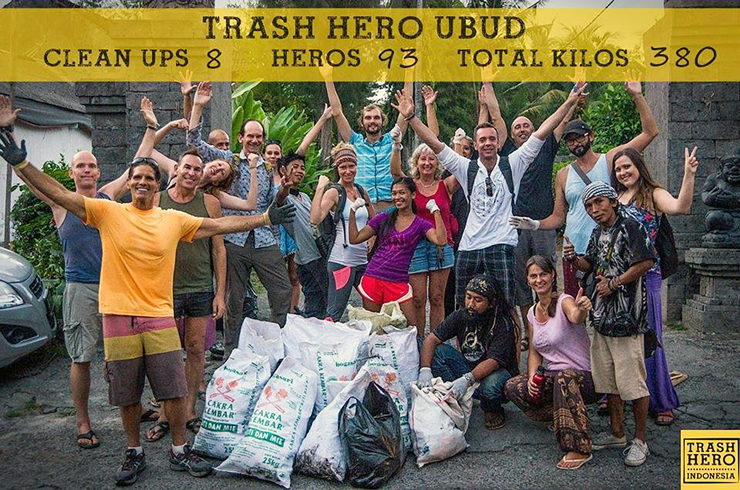 One of the weekly clean-ups in Bali; © Ricarda Schönborn
One of the weekly clean-ups in Bali; © Ricarda Schönborn
New beginnings are always challenging, even more so abroad. How did you settle in back then in Bali and later in Cyprus? How do you manage to build up social networks - especially with locals?
Ricarda: In Bali, it was quite easy to get in touch with locals. There I was actively involved in one of the biggest environmental organisations, "Trash Heroes". This organisation was organised by the locals and people who lived there permanently. In addition, the Balinese are generally a bit more open and cordial to strangers. And I then also learned Bahasa Indonesia, i.e. Indonesian and Balinese.
In Cyprus, the mentality is a bit different in comparison. But I am an open and positive person, so I actually always get in touch with people quickly, even with locals. In addition, I generally prefer to go to places, i.e. beaches, tavernas, supermarkets and so on, where locals also go. And if you approach people in a respectful and friendly way, it's easier to make contact. Unfortunately, the Greek language is very difficult and if you don't have time because of all the work, it's not so easy to learn. Through Cypriot and Greek friends, however, I have already learned a bit more than usual. Nevertheless, I would like to do another Greek course if my job allows it.
"People who travel a lot or live abroad are more flexible, have a more open mindset and greater life experience."
What did you learn about the German mentality abroad? Why do you probably not want to return to your home country?
Ricarda: A very good question! First of all, I learned that - no matter from which country - there are such and such people everywhere. I don't want to use the word positive and negative people. Every person is individual and through their experiences and world view they have adopted patterns that they think are their truth or right or wrong, which is fine.
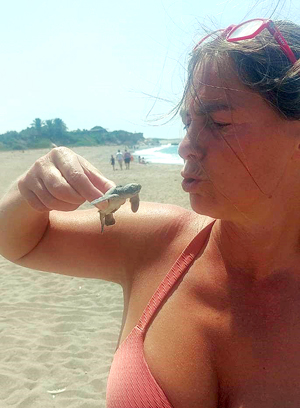 This little turtle would not have made it into the sea on its own in the midday sun - Lara Beach, Cyprus; © Ricarda Schönborn
This little turtle would not have made it into the sea on its own in the midday sun - Lara Beach, Cyprus; © Ricarda Schönborn
Moreover, I have noticed that people - not limited to Germans - who travel a lot or live abroad are more flexible, have a more open mindset and greater life experience. This is particularly noticeable among young people. I can still remember when I volunteered on a rainforest conservation project in Sumatra, Indonesia. There was a 19-year-old German there and I was positively surprised at how "grown up" he already was due to his many journeys.
But I think it's important to say goodbye to some things you're used to and take for granted when you go to another country. Every country has different cultures and perhaps not always the infrastructure or German punctuality and so on that we are used to in Germany. On the other hand, you will find many beautiful things that we don't have in Germany. You should choose your country carefully and weigh up the advantages and disadvantages for yourself. There is no such thing as an "egg-laying cow that can fly" - just like with insurance.
I feel so comfortable here in Cyprus, I have been here for five years and there is no end in sight. But maybe one day my priorities will change, and I will go to another country. I'm not thinking about that yet. It's unlikely that I'll go back to Germany, but it's not out of the question either. The weather and the sea here in Cyprus are sometimes the most important points for me, because that is luxury for me, and I am grateful for them every day. But of course, emigrating doesn't mean that you don't have any more problems. Maybe you even have more, but at least you have new challenges when you leave your comfort zone in your home country.
"Emigrating doesn't mean you don't have problems anymore."
In what way?
Ricarda: You may have new problems. Many people find it difficult to get used to new cultures and the associated mentalities. I also had my difficulties here in Cyprus. An example: Cypriots know that a car purchase should always be preceded by a workshop check. Nevertheless, I bought my BMW without having it checked beforehand, and two days after the purchase I had expensive damage. The Cypriots say of themselves that you should never trust a Cypriot. Here, but also in many other parts of the world, we Germans are considered naïve or at least gullible. Because everything in Germany is highly regulated and standardised, we are used to trusting traders and also institutions to a large extent. But that is not the norm everywhere, and so it happens that you - like me - have to pay a lot of dues elsewhere.
In general, I noticed that it takes at least two to three years before you really get to know a new country in all its important facets. In the first year, most people are still very euphoric and ignore the other side of the coin. But at some point, everyday life sets in, you eventually realise that even in the most beautiful paradise, not everything is going to be perfect.
How would you describe the mentality/attitude of the people in Cyprus - also taking into account that the country is divided?
Ricarda: Basically, I find the mentality of the Cypriots very open and friendly. This is certainly due to the fact that people from different nations have always lived on the island and this is a normal state of affairs for the locals. For decades, many English, Russians, Greeks, Chinese, Arabs and now also more and more people from the DACH region have been living here. So the Cypriots meet everyone completely without prejudice if you approach them in a friendly and respectful way.
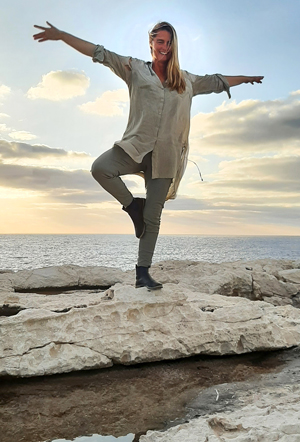 Lara Beach in Akamas, Cyprus; © Ricarda Schönborn
Lara Beach in Akamas, Cyprus; © Ricarda Schönborn
I have also noticed on my travels that people who live in a sunny environment and with the sea on their doorstep tend to naturally be much more positive and "relaxed" than those who do not.
There are also many Greeks living here, and you might think they have the same language and mentality as the Cypriots. But that is not the case. For one thing, the language is somewhat different - similar to Northern Germany and Bavaria. And because of history, both have very different mentalities and basic values.
The Cypriots have suffered a lot from the many wars and battles because many countries wanted to take over Cyprus. Not only Turkey, but also England, earlier the Romans and so on. Cyprus is also a very interesting island from a geopolitical point of view. Even today, there are still territories that are officially British occupied zones. And most people know that the north is occupied by the Turks. So, Nicosia - the capital of Cyprus - is the last divided city in the world, after Berlin was united with the fall of the Berlin Wall. If you want to walk to the other part of the city in Nicosia, it always reminds me a bit of Checkpoint Charlie in Berlin.
"Cypriots are completely non-judgmental towards everyone if you are friendly and respectful towards them."
Speaking of a divided country: You spent your childhood and youth in the former GDR and were thus also affected by the Wende experience. To what extent did this experience help you on your way - especially abroad?
Ricarda: I grew up right on the former border in what is now Saxony-Anhalt. I could practically watch the people in the FRG swimming in their pool from my house. So even in my early childhood I realised that there was still something outside of the limits of the GDR. Politically speaking, it was all bad and evil over there. In advertising, of course, it looked different, because due to our proximity we could - but were not allowed to - receive West German television. Whenever the doorbell rang, we immediately switched to a GDR programme, because it could be an informer. My father was self-employed, so we also got to see the unpleasant things in the East. It was always preferable to work in a state-owned VEB company where everyone was on an equal footing with the "collective".
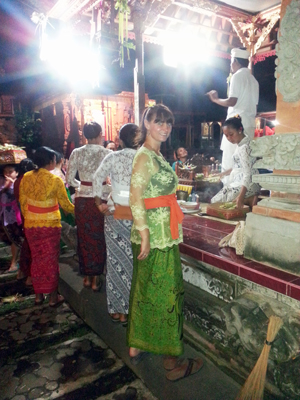 Galungan ceremony in Bali, Ubud; © Ricarda Schönborn
Galungan ceremony in Bali, Ubud; © Ricarda Schönborn
Nevertheless, I had a beautiful childhood and youth. Shortly before the border was opened, I took part in the Monday demonstrations "We are the people". This shows for me that the people in the former GDR had had enough and had the courage to stand up. I miss this courage among Germans today - including the former East Germans. I think it has a lot to do with the influence of the media. The strong focus on negative reporting may also have a paralysing effect and make people passive.
Unfortunately, I didn't experience the fall of the Wall and the direct turning point, as I was in a coma for three months due to a serious car accident as a passenger. When I "woke up" again, the borders were open and it actually took me about a year to process all this. The film "Goodbye, Lenin" illustrates quite well how it was for me.
But this was also an experience where I realised how important good health care is. Because due to the Wende, the old social insurance system in the former GDR disintegrated and was transferred to the West German AOK. For this reason, many organisational things were unclear in the benefit accounting in connection with my accident, and I only received basic care and no rehabilitation. This made me realise, nobody can help me, I can only do this myself. And that's probably why I did my medical training later on. I obtained a lot of literature on naturopathic treatments and Far Eastern medicine, which was very difficult before the publicly accessible internet as we know it today. But I literally bit my way through it, and probably my inner urge to deal extensively with things that interested me helped me.
"Unfortunately, I didn't witness the fall of the Wall and the immediate turnaround, as I was in a coma for three months due to a serious car accident as a passenger."
You have been advising people who want to live abroad for many years on international health insurance cover and health systems. How did you come to specialise in this area?
Ricarda: In 2005, I completed my training as a businesswoman for insurance and finance at the Chamber of Industry and Commerce. I came into the health insurance industry more by chance than anything else. I worked for 15 years in the automotive industry - I worked for the brands Jaguar and Mercedes Benz, among others. I also started to study alternative medicine on the side, because I had always been interested in the topic of health and alternative medicine. When the opportunity arose, I quit my job at Mercedes Benz and completed my studies full-time in two years. More as a part-time job, I worked in a call centre, and I acquired costumers for an insurance company. At that time, I was still quite unprejudiced about the subject, but I had good success due to my friendly and open manner, and so I was offered the opportunity to join the company full-time. Since I enjoyed dealing with people very much, I accepted the offer. Relatively quickly I realised that I only had to sell products for one company. But I wanted to advise the customers in their best interest and the best for them and not for the product provider.
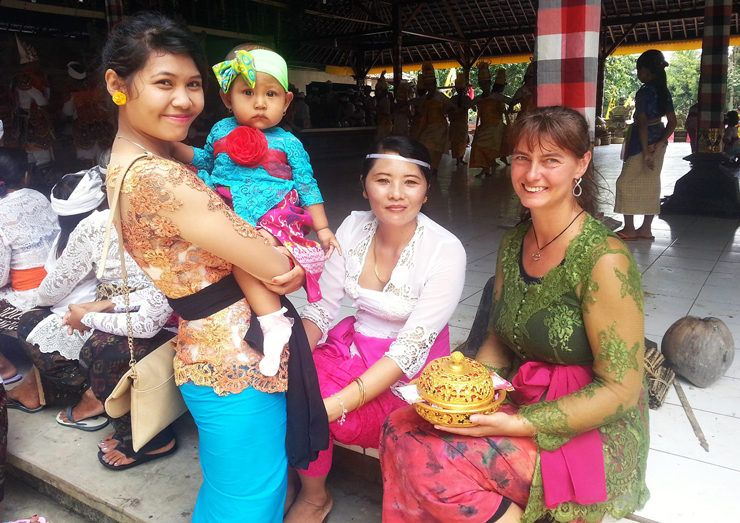 Ceremony with Balinese friends before Nyepi (Hindu New Year) in Bali; © Ricarda Schönborn
Ceremony with Balinese friends before Nyepi (Hindu New Year) in Bali; © Ricarda Schönborn
So, I then changed to a general financial service provider and later to a financial service provider for health insurance. There, too, I had to realise after a year that I also had to sell first and foremost and was not allowed to advise in the interest of the customers. So, in 2009 I started working with a real broker who specialised exclusively in health insurance. Now I was really allowed to give advice, and my medical knowledge - anatomy, pathology, physiology - which I could use for preliminary risk assessments, also helped me. Since 2008, I have specialised exclusively in health insurance, because in my opinion it is one of the most important insurances of all and also a compulsory insurance in Germany, Austria, and Switzerland.
Of course, there are many other things and risks with international health insurance. There is no legal regulation to consider here, but through my many special trainings in Germany I know how to assess these and read them out of the GCIs. As far as I know, there are not many people who can do this, especially in the international field. That's why I put a lot of focus on the "small print", because the most important thing to me is long-term and satisfied clients.
The topic of cover is not a high priority for many when planning their adventure abroad. How do you manage to convince the people you advise that good health cover abroad is essential?
Ricarda: Because my clients come to me exclusively through recommendations, I don't have to convince anyone. It has never been my style to sell through fear, as is often the case in the industry. The right clients find us, and then I get to advise them. In the meantime, I enjoy this very much again, because the emigrants in particular always have an interesting story to tell. So my team and I not only have a personal relationship with our clients, but often also a friendly one.
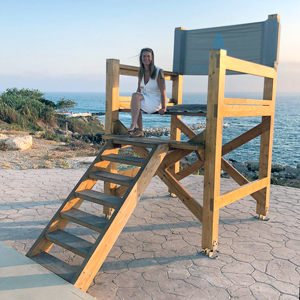 Baracas Beach Bar Paphos, Cyprus; © Ricarda Schönborn
Baracas Beach Bar Paphos, Cyprus; © Ricarda Schönborn
It is also interesting that clients often come to us and want "just accident insurance". Most people do not know the difference between accident insurance and health insurance. When I explain this to them competently, they suddenly understand the need for good international or overseas health insurance. Because actually they thought they wanted to cover the serious illnesses and high risks caused by serious accidents.
In your experience, why do people deal so little and so reluctantly with the existential question of their health insurance?
Ricarda: I think this has several reasons. Firstly, everyone would prefer to live only the beautiful sides of life. First and foremost, this includes good health and financial freedom. That's why most people prefer to think about how they can get a lot of money and work on that. Many people are not aware that a serious illness or an accident can destroy precisely this financial freedom. We are not talking about a few hundred euros here, but about five to six-figure sums. Moreover, anyone who has ever been very ill or had a serious accident knows that you then only want one thing: good medical care. Everything else is then secondary.
"He who is healthy has many wishes, he who is ill has only one"
Unfortunately, I can tell you a thing or two about this from my own experience, and I have accompanied clients when it was a question of whether they would keep their arm or have it amputated. Here I am thinking in particular of the issue of two-class medicine. Because as the saying goes: "Those who are healthy have many wishes, those who are ill have only one".
Another reason for the lack of concern with health insurance is the fact that most people are not aware of the financial risks and almost everyone thinks "it won't affect me". However, this has nothing to do with intelligence and is not intended as an accusation. We have all more or less buried our heads in the sand when it comes to issues we don't like. In my opinion, this is human nature.
You are committed to environmental protection and have worked voluntarily for the organisation "Trash Heroes" in Bali. What is the importance of environmental protection for the people in Cyprus?
Ricarda: Unfortunately, the majority of Cypriots are not yet very aware of the relevance of environmental protection. They prefer to buy fruit and vegetables in the supermarket, even though the most beautiful fruits are hanging on the tree by the road. And unfortunately, rubbish sometimes flies out of the moving cars. But I think this is the case in most countries of the world.
For example, fruit and vegetables are sold in plastic packaging all over the world, where the best packaging, the peel itself, has been removed beforehand. But it is more convenient because many people have little time. We could all have a say by not buying such things at all, because where there is no demand, there is no supply.
But you can already see that more and more people are organising themselves in local environmental protection projects. There are already small local organisations that plant trees or carry out beach clean-ups, which I have often taken part in. Cyprus once had a huge population of cedars hundreds of years ago, as I read in history books about the island. Today, you can only find them in Paphos Forest.
I think environmental protection should be taught to children in school, because in the hamster wheel of everyday life, hardly anyone thinks about our beautiful planet Earth. With the "Trash Heroes" we also worked together with the schools in Bali and tried to explain the topic to the children in a playful way. And it was always so much fun.
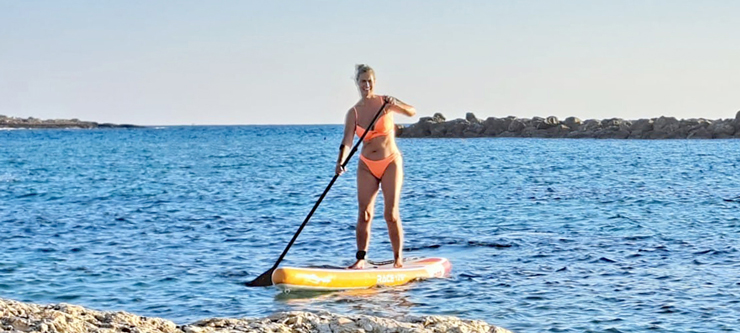 Ricarda Schönborn's new hobby - standup paddling, Venus Beach, Cyprus; © Ricarda Schönborn
Ricarda Schönborn's new hobby - standup paddling, Venus Beach, Cyprus; © Ricarda Schönborn

